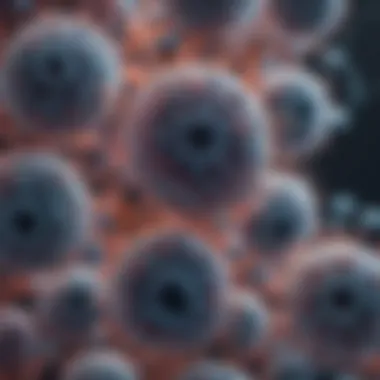The Legacy of Henrietta Lacks: Ethics and Science


Intro
Henrietta Lacks was not just an ordinary woman. Born in 1920, she lived a life that would, unknowingly, change the face of medical research forever. This is her story — a narrative that sheds light on the intricate web of ethics, race, and the relentless pursuit of scientific advancement.
To understand the depth of her impact, it's important to recognize both the person and the circumstances that surrounded her life and death. Henrietta's cells, taken without her knowledge, became known as HeLa cells, and they have been pivotal in countless breakthroughs, including the development of the polio vaccine and advancements in cancer research. However, the story doesn't just revolve around scientific triumph; it's also about the deep ethical violations faced by her family, represented by a broader historical context of racial inequalities.
Objectives of the Article
The aim of this article is not merely to recount Henrietta Lacks’ story but to critically explore the implications her legacy poses. By dissecting her life, the ethical dilemmas surrounding research practices, and the socio-scientific landscape, we invite readers to ponder: What does it mean to have one’s biological material used for research, and at what cost?
Dive in, as we attempt to peel back the layers of this compelling narrative and examine its relevance in today’s world.
Intro to Henrietta Lacks
In the realm of medical history, few stories resonate as deeply as that of Henrietta Lacks. Her life epitomizes the intricate web of ethics, race, and scientific progress, serving as a powerful lens through which we explore the implications of individual autonomy in the medical field. This section aims to set the stage for understanding her monumental legacy, inviting readers to appreciate how her personal circumstances led to monumental scientific advances, while also unveiling the ethical dilemmas that emerged from her story.
Contextual Background
Henrietta Lacks, a woman of African descent, was born in the early 20th century in Roanoke, Virginia. Her upbringing in a segregated society profoundly shaped her experience. Much like the countless others in her community, she faced barriers rooted in racial discrimination and economic hardship. This context is crucial as it highlights the systemic inequities pervasive in medical treatment during that time. Lacks' story is not just about cells; it's about the human experience behind those cells – a reminder of the real lives affected by the healthcare system and its dark corners.
This backdrop is essential in grasping why Henrietta’s case stands as a hallmark in discussions about medical ethics. The collection of her cells — later known as HeLa cells — occurred without her knowledge or consent, igniting conversations that are still relevant today. The intersection of race and medical ethics defined much of her life and the lives of her descendants, prompting urgent discussions that continue to necessitate attention in current healthcare policies.
Henrietta’s Early Life
Henrietta’s early life was marked by significant challenges. Growing up in a close-knit family in a farming community, she faced both racial oppression and societal expectations. By the age of 14, she had already experienced a lot; she gave birth to her first child, leading to a life that required resilience and fortitude. Her parents had passed away by this time, and she took on the role of caretaker for her younger siblings.
Despite the trials she faced, Henrietta was known for her spirited personality. She had a natural instinct for nurturing, whether it was tending to her children or helping her family. However, as her life unfolded in the 1940s and 50s, the struggles intensified. Lacks eventually married David Lacks, and together they had five children. The economic pressures of the time led them to seek better opportunities, prompting them to move to Baltimore, where Henrietta would ultimately seek medical assistance that would change the course of her life and, inadvertently, the entire field of medicine.
Henrietta's pursuit of healthcare was not just a personal endeavor; it was a necessity, fraught with vulnerabilities tied to her socioeconomic status and racial identity. Watching the woman who cared for her family navigate the complexities of the medical world lays a poignant foundation for the story that is to follow. This is where her journey took a crucial turn, setting off a chain of events with ramifications that would extend far beyond her earthly life.
"Her story is a stark reminder of how personal and institutional betrayal can collide in health care, leaving legacies that demand to be acknowledged."
By weaving together her early life and the systemic background, we begin to see how the seeds of an extraordinary legacy were sown, paving the way for a discussion that is both critical and enlightening.
Medical Condition and Treatment
The journey of Henrietta Lacks is intensely intertwined with her medical condition and the subsequent treatments she underwent. This aspect is crucial as it not only details her personal struggle but also sets the stage for the revolutionary outcomes that arose from her experience. The nature of her illness, cervical cancer, exemplifies significant gaps in healthcare, particularly for African American women in the mid-20th century. The treatment she received—and the way it was approached by the medical community—raises complex questions about race, gender, and ethics in medicine.
Diagnosis of Cervical Cancer
In January of 1951, Henrietta Lacks began experiencing unusual symptoms, including abdominal pain and abnormal bleeding. At the time, she was a young mother of five, with a full life ahead of her. Her visit to Johns Hopkins Hospital marked the beginning of a series of events that would have far-reaching consequences. During her examination, Dr. Howard Jones diagnosed her with cervical cancer. This diagnosis, however, was not just about identifying the cancer; it revealed systemic issues in the healthcare system.
At Johns Hopkins, a hospital founded in part to serve the black community, the disparity in treatment options available to black patients was glaring. Lacks was offered radium treatment, a relatively experimental and aggressive approach at that time, which was terrority unexplored for many.
"It’s one thing to diagnose cancer; it’s another to navigate the labyrinth of treatment that follows. For Henrietta, it was a matter of life and death, and the world was just beginning to understand these complexities."


Medical Procedures and Outcomes
The medical procedures that followed her diagnosis included the controversial radium treatment and, eventually, surgical interventions. Despite the invasive nature of radium therapy, Lacks sought treatment with hope. Each step of her healthcare experience underlined her vulnerability, especially as she was unaware of the nature of the cell culture experiments using her tissues that would take place without her consent.
The outcomes of Henrietta's treatment were grim. The cancer continued to spread despite the aggressive treatments, ultimately leading to her death on October 4, 1951. This tragic ending was not only a personal loss for her family but also a pivotal moment that ignited a conversation about patient rights in medical research. The cells taken from her tumor, known as HeLa cells, became globally renowned for their resilience and utility in countless medical advancements, including polio vaccines and cancer research.
Her journey, filled with medical perplexities and ethical dilemmas, illustrates the profound implications of medical practices at that time. The question remains: how much have we learned from the past?
Henrietta Lacks' story brings to light essential considerations for current and future practices in medicine, particularly concerning the respect and ethical treatment of patients. It sheds light on the importance of informed consent and the ethics surrounding the use of individuals' biological materials, emphasizing how past transgressions inform current medical ethics.
The Collection of HeLa Cells
The collection of HeLa cells marks a pivotal chapter in both biomedical research and ethical discourse. Henrietta Lacks' cells underwent unconsented harvesting, opening a Pandora's box of questions around autonomy and ownership of biological materials. HeLa cells became a biological linchpin; their unique properties not only contributed to myriad medical advancements but also drastically shifted the landscape of medical ethics. This section delves into the nuances of how these cells were cultivated initially and what makes them so distinctive.
Initial Cell Cultivation
HeLa cells were first cultured in 1951 at George Gey's laboratory at Johns Hopkins University. Henrietta Lacks had undergone treatment for cervical cancer, and during routine medical procedures, samples of her tumor were taken without her knowledge or permission. These cells defied traditional limitations; they grew and multiplied in ways that were previously unseen. Unlike most human cells that died after a few hours in a culture, HeLa cells continued to thrive. This unpredictable resilience made them irresistible for experimentation.
In those early days, Gey and his team discovered that by providing a nourishing environment—complemented by careful temperature and pH control—they could multiply these cells at an astonishing rate. This breakthrough was a marked shift in how scientists could work with human biological materials, paving the way for reproducible and sustained experiments.
But the cultivation process was not without its challenges. The scientific community had to wrestle with managing contamination, maintaining genetic stability, and ensuring that the cells retained their unique characteristics. Each advancement in cell cultivation not only furthered scientific understanding but slowly morphed into discussions about ethics surrounding cell sourcing.
Characteristics of HeLa Cells
HeLa cells encompass an array of remarkable characteristics that rendered them invaluable to the scientific community. Here are several defining features:
- Rapid Proliferation: One of the standout attributes of HeLa cells is their ability to double in number approximately every 24 hours, a trait that scientists found exceedingly rare and useful for research purposes.
- Immortality: The term "immortal" used here refers to their capacity to live indefinitely in culture, a property that stemmed from certain genetic changes that occurred during the tumor’s growth.
- Robustness: HeLa cells can survive under extreme conditions, including variations in temperature and nutritional availability. This durability enhances their applicability in a wide range of experiments.
Beyond these characteristics, HeLa cells serve as a powerful metaphor for broader ethical discussions. They became not just a scientific tool but also a constant reminder of the complexities surrounding informed consent. This duality invites us to reflect on both the scientific progress they facilitated and the ethical concerns that arose from their collection.
"HeLa cells symbolize the rich intersection of science, ethics, and humanity, prompting a deeper understanding of the implications of our choices in medical research."
As we journey through Henrietta Lacks’ legacy, it becomes clear that the story of HeLa cells is not merely one of scientific success but also one of the lasting impact on ethical practices in medicine. They stand as a testament to both what can be achieved in laboratories and what must be negotiated in the realm of human respect and dignity.
With a clearer understanding of the collection of HeLa cells, we can now glimpse the broader impact of these advancements on medical research, their role in significant scientific breakthroughs, and the ethical implications that must never be forgotten.
Impact on Medical Research
The influence of Henrietta Lacks's story resonates profoundly within the realm of medical research. Her HeLa cells have become invaluable tools that have propelled scientific advancement, proving pivotal in various fields from virology to cancer research. This intersection of ethics, race, and science sheds light on not just the contributions made but the underlying complexities inherent in biomedical research practices.
Scientific Breakthroughs Utilizing HeLa
HeLa cells have been at the forefront of numerous groundbreaking studies since their initial cultivation in the early 1950s. Scientists have harnessed these cells to develop vaccines, study cancer, and even explore the effects of radiation. Notably, the polio vaccine, developed by Jonas Salk, relied heavily on HeLa cells for testing. This was a major leap forward that demonstrated the potential of human cells in cultivating live viruses without risking human subjects' health.
- Cancer Research: HeLa cells have contributed significantly to understanding cancer biology. Researchers utilize these cells to observe the behavior of cancerous tissues, study tumor growth, and develop treatments that target cancer effectively.
- Environmental Impact: Studies utilizing HeLa cells have revealed how certain chemicals may affect human cells—leading to more stringent regulations on environmental pollutants and industrial chemicals.
- HIV Research: The cells are also instrumental in researching and developing treatments for HIV, providing insight into how the virus interacts with human cells.
The impact stretches far beyond mere advancements. HeLa cells represent a fundamental shift in how scientists study human biology, bringing ethical dimensions to the forefront of scientific inquiry.


Ethical Considerations in Research
As beneficial as HeLa cells are, the ethical considerations surrounding their use can’t be ignored. The story of Henrietta Lacks raises significant questions about consent and the autonomy of patients—especially those from marginalized communities.
- Informed Consent: Henrietta did not provide informed consent for her cells to be used in research. At that time, the medical community often overlooked patients' rights, particularly those of African Americans. This reality leads to ongoing dialogue about who controls biological materials and the importance of obtaining consent from patients.
- Exploitation vs. Benefit: Ethical discussions often boil down to whether Lacks was a victim of scientific exploitation or whether her contributions have brought about largely positive outcomes. A fine line exists between utilizing biological materials for significant advancements and commodifying human lives without due consideration for their dignity.
- Policy Changes: The legacy of HeLa cells has prompted changes in policies and practices around biological materials. There’s now greater emphasis on obtaining consent and respecting patient autonomy, though disparities in practice still persist.
"The case of Henrietta Lacks serves as a reminder that scientific progress must go hand-in-hand with ethical responsibility."
As we dissect the impact of HeLa cells on research, we must approach the discussion with a blend of admiration for the scientific achievements and a critique of the ethical oversight—or lack thereof—surrounding Henrietta's story. Her legacy urges researchers and institutions alike to foster an ethical framework that honors individuals while promoting scientific discovery.
Ethical Implications
The legacy of Henrietta Lacks transcends her personal story; it reverberates through the halls of medical research and ethics. Ethical implications serve as a vital lens through which the narrative of HeLa cells unfolds. The absence of consent raises deep questions about patient autonomy and an individual's rights regarding their biological material. Recognizing these implications is crucial to understanding how Lacks' experience reflects broader societal issues. Furthermore, it highlights the need for more robust ethical standards in medical practice.
Consent and Patient Autonomy
At the heart of Henrietta Lacks' story lies the complex issue of consent. When her cells were taken for research without her knowledge, it was not just a violation of policy, but of trust. The 1950s, when this occurred, were devoid of the robust ethical guidelines we see today. Back then, consent was seldom prioritized, particularly for marginalized communities. This notable neglect leads to serious consequences in both ethical practice and community relations in medicine.
By neglecting to obtain informed consent, a critical element of medical ethics, researchers may have inadvertently dismissed the humanity of patients. Henrietta's plight reminds us that each individual is entitled to make decisions about their own body. The ethical dilemmas surrounding her situation urge a reevaluation of how patient autonomy is perceived in clinical settings, especially in minority populations.
- The following points exemplify why consent is paramount:
- It establishes trust between patients and healthcare providers.
- It ensures that individuals are informed of the potential uses of their biological materials.
- It respects personal beliefs and values that might influence decisions regarding medical interventions.
In summary, Henrietta’s case acts as a potent reminder that ethical oversight is not merely procedural; it is fundamental to human dignity and respect in healthcare.
Racial Dynamics in Medical Ethics
Racial dynamics in medical ethics form another cornerstone of Henrietta Lacks' narrative. Her story sheds light on the historical exploitation linked to race in medical research. African Americans have often found themselves on the receiving end of unethical medical practices, a reality that dates back generations. This backdrop becomes particularly salient when examining how the exploitation of Lacks' cells was a culmination of both systemic racism and a disregard for autonomy, especially among Black individuals.
The imbalance in how different racial and ethnic groups are treated in medical research is stark. Minority groups, often perceived as less valuable in a societal context, have frequently been used as unknowing subjects in studies that advance scientific knowledge but neglect their rights and welfare. Although Lacks' legacy has spurred improvements, such as the establishment of ethical standards like the Belmont Report, the rotten roots of racial inequity remain potent.
Consider these fundamental aspects of racial dynamics in medical ethics:
- Historical Mistrust: Generations of exploitation foster a climate of suspicion between minority communities and medical professionals.
- Access to Care: Systemic racism impacts minority groups' access to quality medical care, often resulting in poorer health outcomes.
- Representation: There’s an ongoing need for better representation of diverse populations in clinical trials, ensuring equality in participation and benefits.
"The sickening truth is that many feel that the legacy of the Tuskegee Syphilis Study still casts a shadow over minority participation in medical research".
Legacy of Henrietta Lacks
Henrietta Lacks has become a pivotal figure in the realm of medical ethics and research, raising vital questions about race, consent, and the use of human materials in science. Her legacy extends beyond the significant medical advancements that her cells facilitated. It encompasses a broader narrative that challenges the foundations of ethical practices in medical research, particularly in communities often overlooked. Her story urges us to reflect on the humanity behind scientific progress and the consequences when individuals' rights are sidelined.
The HeLa cells, originating from her tumors, are more than just a biological phenomenon; they are a stark reminder of the exploitation that can occur within the healthcare system. Lacks' experience has prompted discussions on the necessity of informed consent, especially in contexts involving marginalized populations. The legacy of Henrietta Lacks is not merely about the cells; it is also about illuminating the systemic issues entrenched in medical practices and inspiring reforms.
Establishment of the Henrietta Lacks Foundation


The Henrietta Lacks Foundation was founded to honor Henrietta's legacy and address the ongoing implications her story carries. Established in 2010 by her family and advocates, this foundation seeks to provide assistance to individuals whose lives have been affected by unethical medical practices. It serves multiple roles, including:
- Advocacy: The foundation stands as a voice for those affected by similar injustices in medical research.
- Education: Promoting awareness about ethical standards in biomedical research is a key focus.
- Support: The organization offers scholarships and grants to students from underrepresented backgrounds pursuing studies in healthcare and bioethics.
By rekindling public interest in Lacks’ story, the foundation not only keeps her memory alive but actively engages in redefining the ethics of biomedical research.
Cultural and Scientific Recognition
Recognition of Lacks's contributions can be seen in various ways:
- Cinematic Depictions: Films inspired by her life have further illustrated the profound impact of her cells on science and society.
- Honors and Tributes: Numerous awards and honorary recognitions have begun to reflect on her contributions, highlighting the need for ethical awareness in the science community.
"Henrietta Lacks was more than just a name in a laboratory; she was a mother and a human being whose cells transformed modern medicine."
Thus, Henrietta’s legacy serves both as a catalyst for scientific progress and a profound reminder of the ethical responsibilities scientists bear towards their subjects.
Public Perception and Media Representation
The narrative of Henrietta Lacks is a blend of science, ethics, and race that resonates deeply within society, making public perception and media representation crucial. The way Henrietta’s story is framed not only impacts how individuals view medical research ethics but also highlights systemic issues in healthcare that have persisted for generations. Understanding public sentiment surrounding this subject can elevate discussions, promote change, and foster empathy.
Literary Works and Documentaries
These representations serve not just an informative purpose; they ignite discussions and encourage conversations around informed consent and the autonomy of patients. This dialogue fuels social healing and promotes the demand for rightful acknowledgments of those who unknowingly became part of scientific advancement. They allow people to connect with Henrietta on a personal level, ensuring her story stays alive.
Influence on Social Movements
Henrietta Lacks has emerged as a potent symbol in various social movements, particularly those focused on racial equity in healthcare. Her story resonates with many who advocate for marginalized communities, reminding us that the benefits of scientific advancements must be equitably shared. The ongoing conversation about racial discrimination in healthcare is significantly bolstered by Henrietta’s legacy, urging advocates to fight against not just systemic issues but also to demand reform in how consent is handled.
The influence of her story parallels movements like Black Lives Matter, as both challenge the status quo regarding race relations and highlight past injustices. Moreover, organizations and campaigns centered on health equity often cite Henrietta's experience to raise awareness of inequalities that continue to plague healthcare systems today.
"It's not just about Henrietta Lacks; it's about many others who didn't have their stories told. Each voice matters in the fight for justice in medicine."
Finale
The exploration within this article reflects on the profound and complex implications of Henrietta Lacks’s contribution to medical research. Her life, and the subsequent journey of her HeLa cells, act as a crucial backdrop for a discussion on ethics in biomedicine. This conclusion underscores the necessity to consider the ethical frameworks that govern research practices, particularly when individuals' biological materials are involved.
Reflection on Ethical Frameworks in Biomedicine
Henrietta Lacks’s story has exposed serious shortcomings in the ethical paradigms that underpin medical research. The focus on informed consent, which seems commonplace today, was virtually nonexistent during her time. This raises a fundamental question: how do we balance scientific advancement with respect for individual autonomy? Some scholars argue for a more stringent application of ethical standards in research, insisting that future studies must place greater emphasis on the rights and agency of patients.
Moreover, the case of Lacks illustrates the need for a cultural sensitivity in biomedical ethics. It highlights the intersection of race and medical ethics. The systemic exploitation of marginalized communities remains a potent reminder that while scientific inquiry can drive progress, it can also perpetuate harm if not approached with respect and integrity.
"The story of Henrietta Lacks serves as a critical lesson: true progress in science requires the inclusion and respect of all voices."
Implications for Future Research Practices
As we steer further into the future of medical research, what lessons can we glean from Lacks's narrative? One crucial implication is the necessity for transparent practices. This includes clear communication regarding how biological samples are used and ensuring subjects' rights are protected. Researchers need to focus on creating trust, especially among populations that have been historically marginalized.
Additionally, embracing a more inclusive research model may very well lead to more equitable healthcare outcomes. By involving diverse communities in both the research design and implementation phases, scientists can ensure that their work benefits a broader spectrum of society. The HeLa cells serve as a reminder that scientific progress should never come at the cost of sacrificing basic human rights.
Lastly, the conversation spurred by Lacks’s legacy emphasizes the importance of continuous ethical education for researchers. Workshops, discussions, and policy updates should be an integral part of the research landscape. Creating a culture that prioritizes ethics can ultimately enhance both scientific integrity and public trust.
In wrapping up this discourse on Henrietta Lacks, it becomes evident that her story is not merely one of medical achievements but also a clarion call for ethical vigilance in the quest for knowledge. As we move forward, we must remember that behind every innovative discovery, there are human stories that deserve acknowledgement and respect.







